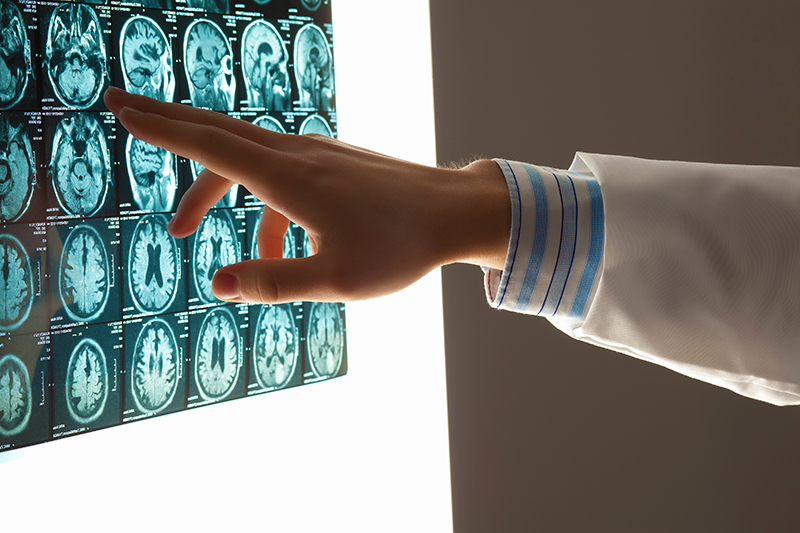Millions of Americans currently live with Alzheimer’s disease or other forms of dementia. Globally, approximately 30% of people aged 90 and over have some type of dementia. While the terms are often used interchangeably, Alzheimer’s disease and dementia are not the same thing.
If you or a loved one are exhibiting symptoms of dementia, you may be wondering how to tell the difference between Alzheimer’s vs. dementia. In this guide, you will learn more about the two conditions, their primary causes, similarities and differences, and options to help you provide the best care possible for your loved ones.

Alzheimer’s vs Dementia: Understanding the Two Conditions
Dementia is a group of symptoms affecting memory and cognitive abilities, while Alzheimer’s is one disease that causes these symptoms. Alzheimer’s disease is a condition characterized by the buildup of beta-amyloid and tau proteins in the brain. The progressive condition causes brain damage that produces classic dementia symptoms. Changes to memory significantly impact a person’s quality of life as the disease progresses.
Understanding Dementia
Dementia is an umbrella term for brain disorders, including Alzheimer’s, that cause declining cognitive abilities, such as confusion and trouble concentrating, learning new skills, or remembering existing ones. Most forms of dementia are progressive, meaning their symptoms worsen as the damage to brain cells spreads throughout the brain.
Symptoms of Dementia
Symptoms of dementia may vary across different types. However, all types affect cognitive ability in some way. Common symptoms of dementia include:
- Changes in memory and learning ability
- Changes in language skills (forgetting words, using simpler words, and difficulty speaking)
- Decreased attention and focus
- Inability to complete everyday tasks
- Poor reasoning skills and judgment
- Unexpected behavior changes
There is no known cure for dementia. However, people with this common condition can receive treatments that may help them deal with the symptoms of dementia. Elder Care Alliance offers a special memory care program for those living with dementia. This program helps people with all types of memory loss connect with others, continue learning, and contribute to society in meaningful ways.
Types of Dementia
Some types of dementia you should be aware of include:
- Frontotemporal dementia results from damage to the brain’s frontal and temporal lobes. It causes personality changes and difficulty with language skills. FTD occurs less commonly than some other types but still affects a large number of people.
- Lewy body dementia is caused by a buildup of Lewy body protein deposits in the brain. It often occurs alongside Parkinson’s or Alzheimer’s disease. Cognitive dysfunction, loss of motor skills, and behavioral changes are its most common symptoms.
- Vascular dementia results from damage to blood vessels in the brain, often from a stroke. Common symptoms include confusion, memory loss, and difficulty with speech and reasoning.
Mixed dementia is a diagnosis reserved for individuals who have more than one type of dementia, such as Alzheimer’s and vascular dementia. People with mixed dementia display symptoms of both diseases they have depending on the areas of their brain that are affected.
Because there are multiple types of dementia with unique treatments, it is important to get a proper diagnosis. While a cure is not possible, proper care can help reduce the severity of symptoms and, in many cases, slow disease progression.

Understanding Alzheimer’s Disease
Alzheimer’s disease is a brain disease that causes dementia. It is the most common cause of dementia, accounting for up to 80% of all cases. This is one reason many people think Alzheimer’s and dementia are the same thing.
The main Alzheimer’s and dementia differences lie in the former being a specific disease and the latter being a general term for cognitive disorders. In other words, if you have Alzheimer’s disease, you have a form of dementia, but not everyone with dementia also has Alzheimer’s.
Alzheimer’s is a physical illness that damages the brain. Early diagnosis is critical to getting effective treatment strategies. Unfortunately, it can take many years for symptoms to progress to the point where they are noticeable.
Early symptoms of Alzheimer’s disease include changes in reasoning and thinking skills, problems with memory, and difficulty learning. These often don’t impact a person’s ability to perform daily tasks independently. Throughout disease progression, symptoms worsen and may consist of severe behavior changes and frequent confusion.
A loved one with Alzheimer’s disease may experience significant behavioral changes, including paranoia and anxiety. You may also notice marked challenges with dates, times, and places. Time shifting is common for people with Alzheimer’s disease, and they may think they are significantly younger than they are. These changes can make communicating with someone with Alzheimer’s very difficult.
Causes of Alzheimer’s Disease and Dementia
Alzheimer’s and dementia’s differences are most notable in their causes. Dementia is caused by several diseases, one of which is Alzheimer’s. Doctors are still unsure of the precise cause of the disease. However, the build-up of beta-amyloid and tau proteins in the brain causes tangles and plaques, which prevent the brain from working optimally.
Alzheimer’s disease causes brain shrinkage and disrupts signaling chemicals, leading to the hallmark symptoms of dementia. There is currently no cure for this disease, but treatments can help minimize symptoms and slow the progression of the disease.
Obtaining a Diagnosis of Dementia or Alzheimer’s Disease
If you suspect a cognitive disorder, take your family member to the doctor for an assessment as soon as possible. If your family member has dementia, the doctor will try to uncover its cause, whether that is Alzheimer’s or something else. However, getting an accurate diagnosis can be difficult, especially in the early stages. Fortunately, it is not urgent to know what type of dementia they have to start care.
Care and Treatment for Alzheimer’s and Dementia
If you or someone you know is showing the early signs of Alzheimer’s or dementia, you are not alone. Resources are available to help you learn more about the disease, which type of dementia your loved one has, and treatment options.
Ignoring symptoms or pretending they do not exist is not the best way to deal with the condition; in some cases, it can lead to a more rapid progression of symptoms. Instead, discuss your concerns with your loved one and suggest testing to get an accurate diagnosis.
Try to be prepared for any unexpected outbursts or abrupt personality changes your loved one may experience while navigating this complicated disease. Learning all you can about Alzheimer’s vs. dementia helps you to know what to expect going forward and how to seek the proper treatment.
If the time comes when you can no longer take proper care of your loved one, there is help available. Elder Care Alliance operates memory care centers specifically designed to keep people with dementia and Alzheimer’s safe, comfortable, and engaged. Contact us if you are considering putting your loved one in a community designed to care for people with dementia or Alzheimer’s.
Compassionate Care for Individuals With Alzheimer’s and Dementia
Elder Care Alliance provides compassionate assisted living and memory care services for individuals living with Alzheimer’s and other forms of dementia. Our specially trained staff can help with activities of daily living while promoting emotional, social, and spiritual well-being. Contact us to schedule a visit to one of our communities.
https://www.alzheimers.org.uk/about-dementia/types-dementia#




















